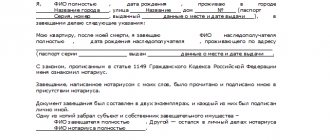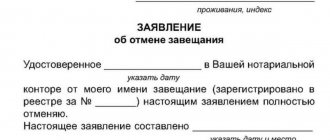Subject of a will in the civil law of the Russian Federation
A will is a personal order of a citizen in the event of his own death in relation to his property. Any individual throughout his life retains the right to bequeath property to certain citizens at his own discretion. A sample of a valid will was developed by the norms of the Civil Code of the Russian Federation. The right to bequeath any property belongs to a citizen throughout his life.
According to the norms of inheritance legislation, the subject of a will can be:
- things;
- security;
- real estate;
- various property rights.
Bequeathed property may also represent a purchase that the testator is just planning to make. The fact of acquired property by the testator is confirmed by relevant documents.
The main requirements for a will are that the subject of the will - the type and name of the property - be clearly formulated.
Vague descriptions and various inaccuracies are not allowed. For example, the type of property, address, code of the type of property, etc. must be indicated. The sample will also includes other information.
Two or more opinions cannot be expressed in a will. If a second person appears in the text or there are two authors, the document will be considered invalid. When writing a will, the presence of witnesses is allowed - two or more people. A sample will can be found at the notary office.
The testator can indicate all main types of property and some especially valuable ones in the will. This also includes property that is at the stage of registration, for example, privatization. The following are exceptions:
- mortgaged property of the prisoner in the form of real estate;
- tax obligations;
- a security whose value has never been assessed;
- property that is at the stage of sale or subject to immediate transfer to another person.
This can also include valuables received from unlawful sources, part of the property that was previously sold to other persons or the division of which took place at the stage of writing a will.
Along with the inheritance, the heir is also assigned certain rights. For example, a debtor who has not paid rent for an apartment received as an inheritance may be deprived of ownership rights to it. It will be very difficult to obtain the return of these rights. In this case, the burden of proof falls on the debtor. To do this, you will have to go to court and draw up a claim, a sample of which can be found at the institution.
Forms of a will and procedure for drawing up
The written document must be certified by a specialist. He will verify the citizen’s sanity and the legality of the conditions contained in the text. Having confirmed the deed, the notary keeps a duplicate and enters data about the written will into the Unified Notary Information System. This is necessary so that if the document is lost, relatives can find out its contents.
Certified by a notary or other persons after reading Art. 1125 1126 Civil Code of the Russian Federation
Let's consider possible ways to write an act on the transfer of ownership of an inheritance (the application is drawn up by the testator personally or, according to him, written by a notary). In the process of drawing up a legal document, technical equipment can be used - a typewriter, etc. Strangers should not take part in drawing up the act. The will is signed by the testator.
After reviewing the paper, it is certified by a specialist. Officials of territorial government bodies and consulates are allowed to certify the paper. The paper has the right to confirm:
- chief physician of the clinic;
- director of a boarding house for the elderly, his deputies;
- the management of medical institutions, which have the right to certify the orders written by their patients;
- captain of a ship that sails with the flag of the Russian Federation and does not stop at ports;
- expedition leaders;
- heads of military units, if the will is written by an employee, and there is no notary company nearby;
- heads of places of detention.
The transfer of possessions at one's own discretion should not be carried out using blackmail or threats. Otherwise, the will will be declared invalid.
Closed will Art. 1126 Civil Code of the Russian Federation
A notary is involved in the adoption of a closed will. This form represents a unilateral drawing up of a deed, since one testator is involved in the process. The meaning of a closed order is that until the death of the testator, no one will know what property and in what amount is given into the possession of the citizen. Even the notary cannot read the document. Such actions will be regarded as non-compliance with the law.
The paper, written during the testator’s lifetime in two copies, is placed in 2 envelopes, which are sealed. They are handed over to the notary for safekeeping. The testator does not have his own sample form of the will; he is only given a paper indicating the action taken. If the procedure for conducting a closed disposition is strictly followed, the will of the deceased will become known only after his death.
A document drawn up in simple written form Art. 1129 Civil Code of the Russian Federation
With such preparation, the participation of two witnesses who are not interested in the outcome of the case is mandatory. They will later confirm the authenticity of this and the adequacy of the owner at the time of drawing up the inheritance will. There are mandatory requirements for the administrative act:
- The preparer must personally write the probate statement in legible handwriting.
- Complete information about the heir and each successor is recorded, including residential address. In this case, no reductions are allowed. If property is divided between several people, then the amount of each must be specified in the will.
- Bequeathed property must be fully described. The text should be clear, specific, without fluff and ambiguous phrases. If real estate is being transferred, it is important to write its full address.
- The testator personally signs the papers and names witnesses. If the owner cannot do this personally (in the absence of a hand), the explanatory circumstances are recorded in the contents of the act.
An order in simple written form, the preparation of which occurred in a dangerous situation, must be confirmed by the court. The proceedings are carried out at the request of citizens who are interested in the outcome of this issue. Requests to hold a meeting must be formalized and submitted to the judicial authority no later than the end of the period specified for taking possession.
Main types of property in the Russian Federation
In accordance with the norms of the Civil Code of the Russian Federation, property is the main object of civil rights, which includes various values, as well as money, the results of material or non-material labor. At the same time, various responsibilities occupy special places here, which can also be transferred by inheritance.
The very concept and types of property are determined by the provisions of the Civil Code of the Russian Federation. Property can mean either a single unit of a thing or a collection of objects - two or more, as well as a security.
In a slightly different meaning, property can cover two objects at once - both the things themselves and the rights to them. Within the framework of inheritance law, the concept of property becomes somewhat narrowed. Any things, as well as rights along with the obligations of the testator, are subject to inheritance.
The Civil Code of the Russian Federation allows for the possibility of transferring property, for example, an apartment, by inheritance, even if, in fact, it does not belong to the testator. Such situations often arise when the testator uses his apartment under a state lease agreement. But it will be able to enter the list of objects of inheritance only after its privatization. The testator will be able to draw up a special document on the transfer of ownership of the apartment to another person. After this, the acquired right to sell and dispose of the property passes to the person specified in the document.
Preparatory stage before making a will
A will is an administrative document containing the last will of a deceased person on the procedure for dividing his property between relatives and strangers. The procedure for drawing up and implementing wills is provided for in the articles of the Civil Code of the Russian Federation.
The execution of a will must be voluntary; no one can force the owner of the property to sign a disposition document.
Actions before registration:
- study of legislation;
- consultation with a lawyer;
- protection of the rights of compulsory heirs.
These steps will help avoid the cancellation of your will. Knowledge of the laws and the involvement of a lawyer will help draw up a legally correct document that failed heirs will not be able to invalidate.
Snezhana Pogontseva
Lawyer, author-editor of the website (Family law, 12 years of experience)
Requirement for the testator
A person who meets the following criteria can make a will:
- coming of age (reaching the age of 18 or obtaining full legal capacity through emancipation);
- sanity (absence of temporary or long-term mental disorders affecting the ability to understand and realize one’s actions);
- ownership of property (since a will can be drawn up even without indicating a list of valuables, the verification of property rights to objects occurs exclusively at the stage of opening an inheritance case, that is, after the death of the testator).
Definition of property
All types of valuables, cash deposits, debt obligations that a person has accumulated during his life can be passed on by inheritance. But at the stage of opening enforcement proceedings, the notary is authorized to conduct an inspection in order to establish property rights to objects, to confirm the legality and amount of the debt.
Choice of heirs
A will is the only way to transfer property not only to the relatives of the deceased.
Values can be divided in equal or different shares between the following participants:
- close relatives;
- distant relatives;
- third parties (foreign citizens);
- legal entities;
- charity organisations.
By will, the testator can deprive the rights to property. But the ban does not apply to persons claiming a compulsory share of property.
Engaging an executor
An executor is a disinterested person involved in the estate in accordance with the last will of the deceased person.
Functions of the executor:
- search for heirs;
- providing assistance in collecting documents;
- control of the timely entry into inheritance rights of each person;
- preservation of hereditary property until the completion of the inheritance process;
- control over the fulfillment of the conditions specified in the will.
The executor knows in advance about the existence of a will and about possible involvement in the procedure. For his work he receives remuneration from inherited property.
Take the survey and a lawyer will share an inheritance action plan in your case for free
You might find it useful:
State duty calculator for inheritance
Samples of inheritance documents
Consultation with a lawyer on inheritance
Real estate, concept and types
The existing classification of types of property as legal objects divides it, first of all, into movable and immovable. The concept and types of real estate are enshrined in the norms of the Civil Code of the Russian Federation.
The composition of real estate includes:
- apartments, businesses and other buildings, both residential and non-residential;
- land plots, subsoil and reservoirs, as parts of the landscape located in a certain territory;
- sea vessels subject to state registration.
Existing types of real estate may include other objects of economic activity, the movement of which cannot be carried out without damage to their functions, purpose and implementation.
A distinctive feature of real estate is also its mandatory registration.
Only if all the necessary legal documents are available, a citizen will be able to prove that this property really belongs to him, and that it is managed, used and disposed of legally. The list of responsibilities of owning real estate includes the need to pay taxes and fees. If there is a debt, the debtor may be deprived of ownership of the property. It will be possible to preserve the rights of the debtor only if the fact of absence of debts or their timely payment is confirmed.
Main types of movable property and types of right to use property
The first section of the Civil Code of the Russian Federation defines movable property as a type of property, the assessment of which does not allow it to be classified as real estate. The concept of movable property also applies to funds, contracts, trademarks, shares and other documents that manage the enterprise. This also includes dividends of the organization, which are also movable property received from various sources.
A security will be movable property, but only if this value is proven during general verification and registration. A sample security provides for the mandatory availability of all necessary data to recognize it as such.
The right to use property represents the legal right to extract useful properties and profits from it, which are dividends. Basic property rights are divided into possession, use and disposal. All these special rights also carry a set of obligations that are an inseparable part of the rights, for example, regular payment of taxes.
Inventory of certain types of property
Inventory is a special procedure for checking property owned by budgetary institutions, government entities, enterprise insurance institutions, etc., as well as economic activities that are carried out within the framework of the organization’s work.
Inventory of certain types of property is aimed, first of all, at obtaining reliable data on property managed by a state enterprise, ensuring its safety and accounting. This procedure is also necessary for the formation of economic activities of budgetary institutions, joint-stock companies, insurance organizations and other legal entities.
The legislation of the Russian Federation establishes the types of property intended for inventory, which may participate in it: fixed assets and intangible assets, dividends of the organization, packages of contracts, securities, blocks of shares, cash and other valuables that are part of the formation of economic activity and management budgetary and commercial institutions. Each type of property is characterized by a code of the type of property, which is inextricably linked with a specific thing.
To carry out an inventory of an enterprise, budgetary institutions, joint stock company, etc., a permanent commission is created to check economic activities.
The procedure for inventory and accounting of property can be either planned or sudden. It is mandatory in the following cases:
- transformation of budgetary institutions or state enterprises;
- privatization;
- preparation of annual financial statements on the economic activities of the organization;
- change of financially responsible persons.
Other cases of mandatory property accounting include:
- division of property of a joint-stock company or organization;
- registration of a new institution;
- sale of property;
- change of managers, etc.
Property insurance and property valuation
Property valuation is an important step that helps determine the size of the share of certain individuals who own the property.
The Civil Code of the Russian Federation establishes certain methods for assessing the value of property. During the formation of the valuation of a particular property, the latter receives its own value, which is as follows:
- market;
- liquidation;
- investment;
- cadastral
Each of them has certain features of price formation and an individual accounting procedure.
The property interests of individuals or legal entities may manifest themselves in cases of damage, destruction and theft of their property.
When insuring valuable property, this property acts as an object of insurance.
In accordance with the Civil Code of the Russian Federation, the property of legal entities, for example, an enterprise, government agency, etc. subject to voluntary insurance. The insurance procedure itself is based on the signing of a special agreement by the parties, which specifies all the data. This information may include:
- current forms of ownership;
- features of the use and management of this or that property;
- list of obligations of the parties;
- procedure for accounting for property and insurance, etc.
Is it worth writing a will?
In the absence of an expression of will, the testator's property will be distributed in accordance with legislative acts. Direct heirs must take into account the deadlines and requirements prescribed by law; second-order successors can write an application for inheritance, etc. People of each subsequent category are given 3 months from the end of the period or refusal of the previous ones. If you miss the opportunity, it will be extremely difficult to get what you want.
No less pressing is the question of whether it is necessary to draw up a will for the only heir. Here everything depends on the wishes of the will-maker. It is permissible to write a will by hand or on a printing device, but the signature must be affixed by hand. One copy remains with the testator, and the second in the archives of the notary’s office in the region of residence of the latter.
If you want to keep what is stated in secret, you can draw up a closed will, the contents of which will be known only to the testator. The text is written by the latter personally and registered by a notary in a closed envelope. The document will be opened after the death of the will-maker. When the testator makes a will, two witnesses must be present. This approach will help avoid further disagreements. A will drawn up in front of witnesses will not be challenged during the trial and will be declared invalid.
Property taxes, types of property accounting and property type code
Certain types of property may be used by municipalities.
The Civil Code of the Russian Federation identifies types of municipal property:
- property intended for the implementation of their functions by local government bodies and officials;
- property required to resolve certain issues by municipal authorities.
In our country, there is the concept of a tax on property owned and used by individuals or legal entities. Its size is established by the tax authority at the place of registration of the property.
Division of property during inheritance
In his will, the testator has the right to indicate the exact size of the shares for each of the heirs. In the absence of any disputes or claims, the division of property after the death of the testator, in this case, will take place without difficulty, based on the information specified in the will. In this case, the size of each share can be either equal or individual for each individual. According to the same scheme, the division of funds, valuable property, as well as monetary and other obligations included in the inheritance mass occurs.
When the testator's order gives rise to disputes between the heirs, or when there is no will, the division of shares of property or funds will occur on the basis of law. This may include dividends or other types of income received from various sources.
In case of additional difficulties, for example, when it is necessary to divide an indivisible thing between heirs, payment of funds to other heirs as compensation is allowed. The assessment of the value of certain valuable property is carried out by persons who have the right, in accordance with the law, to engage in appraisal activities. At the end of the procedure, the applicant is given a special report (conclusion) containing all the necessary data on what results were obtained.
In cases where the inheritance includes real estate or part of it, the heirs need to carry out the procedure for its registration or privatization. You can register it with the appropriate organization.
Author of the article
What the dead man said
There are no official statistics on this matter, but, according to some data, every fifth will is attempted to be revoked after the death of its maker. Overlooked by the deceased person, everyone who did not see their name in the will went to court en masse. There they tried and are trying to prove that the deceased was not himself and at the time of writing the will simply was not aware of his actions. Such a case was reviewed by the Judicial Collegium.
It all started when a woman brought a lawsuit to the district court against her sister with a request to recognize the will of her deceased mother as invalid. The fact is that during her lifetime the mother assigned everything she had to only one of her daughters. Having learned that they had left her nothing, the bypassed citizen went to court and stated that her mother suffered from a mental disorder during her lifetime and had been registered at a psychoneurological dispensary since 1983. Therefore, there is no faith in the will.
The plaintiff lost the first instance - the district court. The district court's decision states that there is no evidence confirming that the elderly woman was inadequate during her lifetime. But there are a lot of witnesses who spoke in court about the complete adequacy of the person. But the presence of a mental illness in the deceased, the court said, does not indicate the inability of the testator to understand his actions.
The appeal agreed with this decision. The offended plaintiff reached the Supreme Court.
How did the Supreme Court reason? According to Article 1118 of the Civil Code, property can only be disposed of in the event of death by drawing up a will. Another article of the same code states that there are violations that make a will invalid. There are two types of wills that are “wrong”. So-called voidable wills are those that have been found to be incorrect in court, and regardless of the court's opinion, they are simply void wills.
At the same time, the court emphasized that legally significant circumstances for resolving such disputes are the presence or absence of a mental disorder in the testator at the time of drawing up the will.
The Judicial Collegium for Civil Cases also stated that an expert’s opinion in such disputes is not necessary for the court. But it should not be assessed arbitrarily, but in mutual connection with other evidence.
When the district court considered this case, it did not agree with the conclusions of two forensic psychiatric examinations, but referred to the testimony of witnesses. According to their stories, the elderly woman was surprisingly sane.
The Supreme Court responded to this conclusion of its colleagues by quoting Article 69 of the Civil Procedure Code. This article explains what a witness is. According to the law, a witness is a person who may know some facts or information about circumstances that are important for the consideration of the case. But information provided by a witness cannot be evidence if he cannot name the source of his knowledge.
The conclusion from what has been said is that witness testimony could establish facts indicating the characteristics of the elderly woman’s behavior, her actions, actions and attitude towards them. But in order to establish, on the basis of these words, whether a citizen has mental disorders, the degree of such disorders, special knowledge is needed, which neither the neighbors, nor the notary certifying wills, nor the court have. Yes, the court took into account the stories of witnesses. The court asked the experts from the psychoneurological clinic to evaluate the neighbors’ stories in their conclusion. Experts called the testimony of loved ones unprofessional, superficial and “contrary to the patterns of the clinic, the course and outcome of the schizophrenic process.” The repeated examination of the Research Institute of Forensic Psychiatry named after N.I. agreed with these conclusions. Serbian.
The Supreme Court emphasizes that based on the value judgments of witnesses about the behavior of the testator, the court concluded that the elderly woman was normal when drawing up and signing the will and understood everything. At the same time, the court did not take into account the conclusion of forensic experts, made according to a legal procedure and on the basis of special knowledge in psychiatry and medical documents of the deceased, which spoke about her illness, its course and development. By the way, the plaintiff wrote exactly about this in her appeal. But they didn’t hear her.
Now, by decision of the Supreme Court, this case will be reconsidered.










